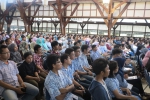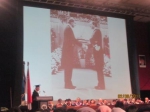Physics Nobel Prize Talkshow 2022: A Study on the Culture and the Development of Research in Indonesia
BANDUNG, itb.ac.id – Physics Nobel Prize Talkshow 2022 was held at the Faculty of Industrial Engineering Meeting Room at the Labtek V building and was broadcasted online via Zoom Meeting on Friday (14/10/2022). This event was aimed to improve our understanding of the research and learning culture of the 2022 Nobel Prize in Physics winner.
Three ITB professors attended the talk show, Prof. Hermawan K. Dipojono from the Faculty of Industrial Technology (FIT), Prof. Andriyan B. Suksmono from the School of Electrical Engineering and Informatics (SEEI), and Prof. Freddy P. Zen from the Faculty of Mathematics and Natural Sciences (FMNS).
The 2022 Nobel Prize in Physics was awarded to Alain Aspect (France), John F. Clauster (USA), and Anton Zeilinger (Austria) and was announced by the Sweden Royal Academy of Science in Stockholm on 4 October 2022. The three scientists have researched the quantum mechanics effect on two entangled particles for around thirty years.
Their research succeeded in explaining that what happened to a particle in an entangled pair will determine what will happen to the other pair, even if they are far apart. With this discovery, mechanical quantum will enter a new stage of previously unimaginable applications.
According to Prof. Freddy, their success is rooted in the consistency that they have entangled in their research culture. Single fundamental research sometimes needs years or decades to complete. The consistency of a scientist is the main capital for the discovery of new knowledge. Moreover, Prof. Hermawan also added that the success in winning a Nobel Prize is a phenomenon that started from only a dream.
"Fundamentally we need to build a dream, especially for the younger generation. Because if we don't even have a dream, our journey would not even begin. But if we dare to dream, that is possible (winning a Nobel Prize). The key lies in curiosity and the courage to dream," he said.
The reality in Indonesia, the gap between national and world-class research that can win you a Nobel Prize is still very far. One of the causes is, according to Prof. Hermawan, a low level of curiosity in our people. This is in contrast with the number of opportunities that Indonesia has as a young nation with a lot of developmental problems.
Even so, Prof. Andriyan admitted that research in Indonesia has been developing a lot in terms of its funding and output. Pioneering research in Indonesia requires broad access to the latest information as a source of reference and inspiration. In addition to that, the development of a productive research group is also important as it can create a supportive environment in which new ideas and discoveries can prosper.
Prof. Andriyan added, "Each scientific field has its own specific tasks. For example, FMNS researches basic science, engineering researches its implementation for the benefit of humanity. This division is what needs to be encouraged to answer the needs for new fundamental research."
Indonesia's readiness in developing fundamental science does not have to come entirely from within the country. Collaboration research offers wide opportunities for scientists to develop their research. This is proven by scientists from developing nations that have succeeded in winning a Nobel Prize because of their collaboration with international research groups.
ITB as one of the environments that pioneers world-class research in Indonesia continues to encourage its academicians to expand their knowledge in finding new fundamental knowledge as a part of its manifestation as a "locally relevant and globally respected" campus.
"Even if we do not have all the resources, we can look for other alternatives. Don't be discouraged if we don't have the necessary facilities, because right now is the era of collaboration. So it is not a problem if we have some constraints, because we are a member of a global community. What's left is how we find connection and network, which can always be found even though sometimes it takes patience."
Reporter: Hanifa Juliana (District and City Planning, 2020)
Translator: Favian Aldilla R (Civil Engineering, 2019)

scan for download






